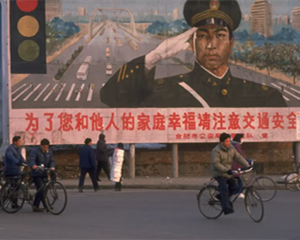I saw how much I had never even known to ask. The essay showed how quick his mind was, his sharp awareness of the history he was living through. I looked for his other writings. He had published four volumes of fiction and countless articles in journals and newspapers. But during the chaotic years of the Cultural Revolution and its aftermath, his books had gone out of print. Our family had lost their copies. I asked my relatives to help me find them, and even enlisted Chinese friends to help me search, but novels by Qian Feng weren't listed in the used books databases, and I still haven't found them.
我看到了很多我从未知道也从未想要问的东西。从这篇文章能看出爷爷思维的敏捷,他对自己所经历的历史有着敏锐的认识。我又找了一些他的其他作品。他出版了四卷小说,在报刊杂志上发表过无数篇文章。然而他的书在文革及其余波的混乱岁月里已经绝版,就连家里的副本也已丢失。我曾托亲戚帮我找,还找了中国朋友帮我找,然而钱峰的小说并没有列在旧书数据库里,所以到现在我也没有找到。
Some notes from my journal, from that visit to China:
我日记中的一些笔记,关于那次中国之行:
At dinner with yeye, he looked at me and said, zhe ge gu niang shen me gui xing? ('What is this girl's last name,' or more properly, 'What family is this girl from?') …
记得我和爷爷在餐桌上,他望着我说:这位姑娘贵姓?(“这个女孩姓什么?”或者更确切地说,“这个闺女是谁家的?”)
Later we asked him how old he was, and he said 95. How many children did he have? Three. What were their names? Xiaojiang, Xiaobing, Xiaoer. Xiaosan. Then my aunt asked, So how many children is that? Isn't that four? Do you have any other children, or is that it? (He'd forgotten his fifth child, his eldest daughter.) …
后来我们问他多大了,他说95岁。问他有几个孩子?三个。他们叫什么名字?小江、小兵、小二、小三。阿姨又问:这是几个孩子?这不是四个吗?你还有其他孩子吗,还是就这些了?(他忘记了他的第五个孩子,他的大女儿)……

At dinner I watched nainai break open a crab shell and spoon the yellow yolk on to bread for yeye, very quietly, while everyone else was talking. Jostling his elbow so he'd look down and see the bread in his hand, and methodically, unthinkingly eat it. His eyes barely open any more, I don't know if he sees. …
吃饭时,当其他人都在说话的时候,我静静地看着奶奶掰开一个蟹壳,把蛋黄舀到馒头上喂爷爷。奶奶碰碰他的胳膊肘,他低头看到手里的馒头,然后就想也不想地慢慢吃下去。他的眼睛也快睁不开了,我不知道他能不能看到。 …
I realised this may be the last time I see yeye.
我意识到这可能是我最后一次见爷爷。
After her birthday dinner, I spent three days interviewing my grandmother. Because she spoke in a thick dialect, my aunt had to be there to translate into standard Mandarin for me. In the evenings the three of us piled into the old, familiar bedroom across the only bathroom in the apartment, my grandmother grumbling about her hearing aids while I fiddled with the microphone. Together, we tried to cobble together some understanding of her history.
在祖母的生日晚餐后,我花了三天时间采访她。因为她的方言很重,我的阿姨必须在那里帮我翻译成标准的普通话。晚上,我们三个人挤进公寓唯一一间浴室对面的那间又老又熟悉的卧室,我的祖母在抱怨她的助听器,而我则在摆弄麦克风。我们试图将她的过去拼凑起来。











